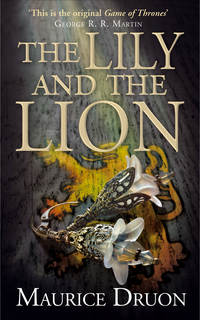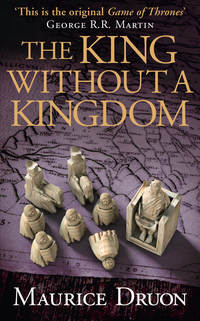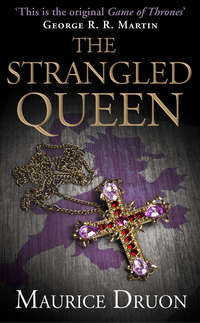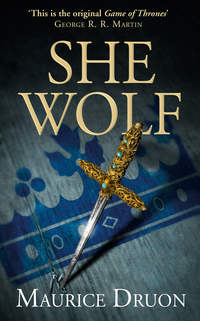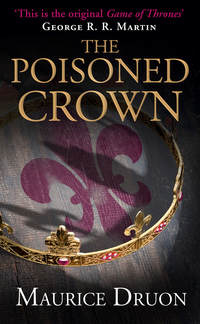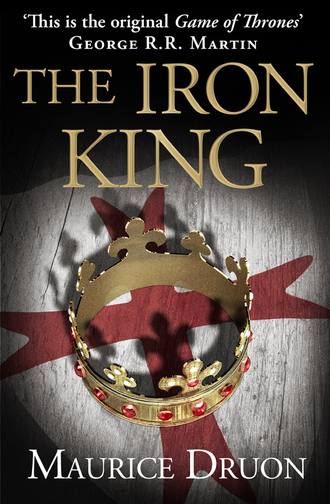
Полная версия
The Iron King
‘Oh, Lord my God,’ he cried, ‘why hast Thou given me greater strength of body than of mind? Was I worthy to command the Order? Thou hast not prevented my falling into cowardice; spare me, Lord God, from falling into folly. I cannot hold out much longer, no, not for much longer.’
He had been in chains for seven years, only leaving his dungeon to be dragged before the commission of inquiry, and to be submitted to all the pressures and threats that the theologians and lawyers could devise.
In the circumstances one might well fear madness. Often the Grand Master lost all sense of time. As a distraction, he had attempted to tame a couple of rats that came every night to eat the remains of his bread. He passed quickly from anger to tears, from crises of religious devotion to a longing for violence, from idiocy to fury.
‘They’ll die of it, they’ll die of it,’ he kept repeating to himself.
Who would? Clement, Guillaume, Philip. … The Pope, the Keeper of the Seals and the King. They would die. Molay did not know how, but it would certainly be amid appalling suffering and in expiation of their crimes. He unceasingly chewed over these three hated names.
Still upon his knees, his beard raised towards the narrow window, the Grand Master murmured, ‘I thank thee, Lord God, for leaving me hatred. It is the sole force that sustains me now.’
He got painfully to his feet and went back to the stone bench which, cemented to the wall, served both for seat and bed.
Who could ever have thought that he would come to this? His mind constantly returned to his youth, to the boy he had been fifty years before, as he came down the slopes of his native Jura in search of adventure.
Like all the younger sons of the nobility of the time, he had dreamed of wearing the long white mantle with the black cross, the uniform of the Order of the Knights Templar. In those days, the mere name of Templar evoked the epic and the exotic, ships with bellying sails scudding towards the Orient, lands where the skies were always blue, charges at the gallop across the desert sands, treasures of Arabia, ransomed prisoners, captured and pillaged cities, fortresses with huge staircases, built beside the sea. It was even said that the Templars had secret ports from which they embarked for unknown continents.4
And Jacques de Molay had achieved his dream; he had marched proudly through distant cities, clothed in the superb mantle whose folds hung down to his golden spurs.
He had risen in the Order’s hierarchy, higher than he had ever dared hope, achieving every dignity in turn, at last to be elected by the brothers to the supreme function of Grand Master of France and Overseas, and to the command of fifteen thousand knights.
And all this had but led to a dungeon, horror and destitution. Surely few people’s lives could show such prodigious success followed by so great a fall.
Jacques de Molay was idly tracing lines with one of the links in his chain upon the damp mould on the wall, lines which reminded him of the plan of some fortress, when he heard heavy footsteps and the noise of arms upon the staircase that led down to his cell.
Once more he was seized with a feeling of pain, but this time it was precise and definite.
The heavy door creaked open and, behind the gaoler, Molay saw four archers dressed in leather tunics and carrying pikes. Their breath spread out in a thin cloud before their faces.
Their chief said, ‘We have come to fetch you, Messire.’
Molay rose silently to his feet.
The gaoler came forward and with cold chisel and heavy blows of a hammer broke the rivet that fastened the chain to the heavy iron anklets. Each weighed four pounds.
He clasped his great, illustrious mantle, now no more than a grey rag, its black cross in tatters at the breast, about his emaciated shoulders.
They left the dungeon. And in that reeling exhausted old man, his feet weighed down with fetters as he mounted the tower’s steps, there could still be seen something of the commander who had recaptured Jerusalem from the Saracens for the last time.
‘Oh, Lord my God,’ he murmured to himself, ‘give me strength, give me a little strength.’ And to help himself find it, he repeated the names of his three enemies: Clement, Guillaume, Philip.
Fog lay thick upon the huge court of the Temple, cloaked the turrets of the enclosing wall, flowed through the crenellations, and obscured the spire of the great church on the right of the tower.
A hundred soldiers were standing at ease, talking quietly among themselves, as they stood round a big, square, uncovered wagon.
From beyond the walls he could hear the murmur of Paris and the occasional neigh of a horse, sounds that moved him with an ineffable sadness.
Messire Alain de Pareilles, Captain of the King’s Archers, the man who attended every execution, who accompanied the condemned to sentence and torture, was walking up and down the centre of the yard, his face impassive, his expression bored. He was forty years old and his steel-coloured hair fell in a short fringe across his square forehead. He wore a coat of mail, had a sword at his side, and carried his helmet in the crook of his arm.
He turned as he heard the Grand Master’s approach, and the latter, seeing him, turned pale, if it were possible for his pallor to increase.
Merely for interrogations there was not, as a rule, so much display; there were neither wagon nor men-at-arms. A few royal agents came to escort the accused, generally at nightfall, by boat across the Seine.
The presence of Alain de Pareilles was alone significant enough.
‘Has judgment been pronounced?’ Molay asked the Captain of the Archers.
‘It has, Messire,’ he replied.
‘And do you know, my son,’ Molay asked after a moment’s hesitation, ‘what that judgment contains.’
‘I do not, Messire. My orders are to conduct you to Notre-Dame to hear it read.’
There was a silence, then Jacques de Molay asked, ‘What day is it?’
‘The Monday after the feast of Saint Gregory.’
This corresponded to the 18th March, the 18th March 1314.5
‘Am I being taken out to die?’ Molay wondered.
The door of the tower opened again, and three other dignitaries appeared in their turn, escorted by guards, the Visitor General, the Preceptor of Normandy and the Commander of Aquitaine.
They had white hair, and white unkempt beards, their deep-sunken eyes blinked in the light, their bodies seemed to float in their ragged mantles; for a moment they stood still, like great night-birds unable to see in the light. Moreover, the Commander of Aquitaine had a white film over his left eye which gave him something of the appearance of an owl. He seemed completely stupefied. The semi-bald Visitor General had horribly swollen hands and feet.
It was Geoffroy de Charnay, the Preceptor of Normandy, who first, though hampered by his irons, rushed up to the Grand Master and embraced him. There was a long friendship between the two men. Indeed, it was Jacques de Molay who had helped Charnay in his career. Ten years younger than himself, he had looked upon Charnay as his successor.
Charnay’s forehead was furrowed by a deep scar, the legacy of an old battle in which a sword-cut had also given him a crooked nose. This rugged man, his face marked by war, leant his forehead against the Grand Master’s shoulder to hide his tears.
‘Have courage, Brother, have courage,’ said the Grand Master, clasping him in his arms. ‘And you, too, my Brothers, have courage,’ he went on, embracing the other dignitaries in turn.
Seeing each other, they were able to judge of their own appearance.
A gaoler came up.
‘You have the right to have your irons removed, Messires,’ he said.
The Grand Master spread wide his arms in a bitter, hopeless gesture.
‘I have not the money,’ he replied.
For each time they left their prison, in order to have their irons removed and replaced, the Templars had to pay a denier out of the dozen they were allowed for their wretched food, the straw in their dungeons and the laundering of their single shirt. Another of Nogaret’s subtle cruelties! They were accused, but not condemned. They had the right to a maintenance allowance. What was the use of twelve deniers, when a small joint of meat cost forty? It meant starving four days in eight, sleeping on the hard stone, rotting in squalor.
The Preceptor of Normandy took the last two deniers from the old leather purse attached to his belt and threw them on the ground, one for his own irons and one for those of the Grand Master.
‘My Brother!’ said Jacques de Molay with a gesture of refusal.
‘For all the use they are likely to be to me now,’ replied Charnay. ‘Accept them, Brother; there is not even merit in the giving.’
As the iron pins were removed, they felt the hammer-blows resounding in their bones. But they felt the blood pounding in their chests more strongly still.
‘This time, we’ve come to the end,’ Molay murmured.
They wondered what kind of death had been reserved for them, whether they would be subjected to ultimate tortures.
‘It is perhaps a good sign that our irons are being removed,’ said the Visitor General, shaking his swollen hands. ‘Perhaps the Pope has decided upon clemency.’
There were still a few broken teeth in the front of his mouth and these made him lisp, while the dungeon had turned his mind childish.
The Grand Master shrugged his shoulders and pointed to the phalanx of a hundred archers.
‘We must prepare to die, Brother,’ he said.
‘Look, look what they have done to me,’ cried the Visitor, pulling up his sleeve to show his swollen arm.
‘We have all been tortured,’ said the Grand Master.
He looked away, as he always did when someone spoke of torture. He had yielded, he had signed false confessions and could not forgive himself.
He looked round upon the huge group of buildings which had been the seat and symbol of their power.
‘For the last time,’ he thought.
For the last time he gazed upon the vast assembly of tower and church, palace and houses, courts and gardens, a fortified town within Paris itself.6
Here it was that for two centuries the Templars had lived, prayed, slept, given judgment, transacted business, and decided upon their expeditions to distant lands. In this very tower the treasure of the Kingdom of France had been deposited, confided to their care and guardianship.
It was here, after the disastrous expeditions of Saint Louis, in which Palestine and Cyprus had been lost, that they had come, bringing with them in their train their esquires, their mules laden with gold, their stud of Arabian horses and their negro slaves.
Jacques de Molay saw in his mind’s eye this return of the vanquished. Even so, it had something of an epic quality.
‘We had become useless, and we did not know it,’ thought the Grand Master. ‘We were always talking of reconquest and new crusades. Perhaps we showed too much arrogance, and enjoyed too many privileges while no longer doing anything to justify them.’
From being the permanent militia of the Christian world, they had become the permanent bankers of Church and King. To have many debtors is to have many enemies.
Oh, the plot had been well conceived! The drama had begun upon the day when Philip the Fair had asked to join the Order that he might become its Grand Master. The Chapter had replied with a curt and definite refusal.
‘Was I wrong?’ Jacques de Molay asked himself for the hundredth time. ‘Was I too jealous of my authority? But no; I could not have acted otherwise; our rule is binding: no sovereign princes in our ranks.’
King Philip had never forgotten the repulse and the insult. He had begun by dissimulating, lavishing favours and kindnesses upon Jacques de Molay. Was not the Grand Master godfather to his daughter, Isabella? Was not the Grand Master the prop and stay of the kingdom?
Yet the royal treasure had been transferred from the Temple to the Louvre. At the same time a low, venomous campaign of obloquy had begun against the Templars. It was said that they speculated in corn and were responsible for famines, that they thought more of increasing their fortune than of capturing the Holy Sepulchre from the heathen. They were accused of blasphemy merely because they spoke the rough language of the camp. ‘To swear like a Templar’ became the current saying. From blasphemy to heresy was but a step. It was said that they practised unnatural vice and that their black slaves were sorcerers.
‘True it is that all our Brothers were not saints and that inaction was bad for many of them.’
Above all, it was said that during the ceremonies of initiation the neophytes were compelled to deny Christ and spit upon the Cross, that they were subjected to obscene practices.
Under the pretext of putting an end to these rumours, Philip had suggested to the Grand Master, for the sake of the honour and interest of the Order, that an inquiry should be opened.
‘And I accepted,’ thought Molay; ‘I was abominably duped and deceived.’
For, upon a certain day in October 1307 … oh, how well Molay remembered that day! ‘Upon its eve, he was still embracing me, and calling me brother, indeed giving me the place of honour at the funeral of his sister-in-law, the Countess of Valois.’
To be precise it was upon a Friday the thirteenth, an unlucky day if ever there was one, that King Philip, by means of a widespread police net, prepared long before, had arrested all the Templars of France at dawn upon a charge of heresy in the name of the Inquisition.
And Nogaret himself had come to seize Jacques de Molay and the hundred and forty knights of the Mother House.
Suddenly an order rang out. It startled the Grand Master and interrupted the flow of his thoughts, those thoughts in which he sifted yet once more the cause of the disaster. Messire Alain de Pareilles was drawing up his archers. He had put on his helmet. A soldier had his horse by the head and was holding his stirrup.
‘Let us go,’ said the Grand Master.
The prisoners were hustled towards the wagon. Molay climbed into it first. The Commander of Aquitaine, the man with the white film over his eye, who had defeated the Turks at Acre, still appeared utterly stupefied. He had to be hoisted up. The Brother Visitor was moving his lips in ceaseless, silent muttering. When Geoffroy de Charnay’s turn came to climb onto the wagon, an unseen dog began howling from somewhere in the neighbourhood of the stables, and the scar upon the Preceptor of Normandy’s forehead puckered deeply.
Drawn by four horses in tandem, the heavy wagon began to move forward.
As the huge gates opened, the crowd set up a great clamouring. Several thousand people, all the inhabitants of that district and the neighbouring ones, were crowding against the walls. The leading archers had to force a passage through the howling mob with blows of their pike-shafts.
‘Make way for the King’s men!’ cried the archers.
Erect upon his horse, his expression still impassively bored, Alain de Pareilles dominated the tumult.
But when the Templars appeared, the clamour was suddenly stilled. At the spectacle of these four emaciated old men, whom the jolting of the unsprung wheels jostled against each other, the people of Paris suffered a moment of dumb stupefaction, of spontaneous compassion.
But then cries arose of ‘Death! Death to the heretics!’ from royal agents mingling with the crowd. And then the people, always prepared to shout on the side of power and to make a noise when it costs them nothing, began to yell in concert, ‘Death to them!’
‘Thieves!’
‘Heretics!’
‘Look at them! They’re no longer so proud today, heathens that they are! Death to them!’
Insults, gibes, threats rose along the whole length of the grim procession. But the frenzy was sporadic. A whole section of the crowd remained silent, and its silence, though prudent, was none the less significant.
For things had changed in the seven years that had elapsed. The way the case had been conducted was known. People had seen Templars at the church doors showing the public the bones fallen from their feet as the result of the tortures they had suffered. It was known that in many of the towns of France the Knights had been burned by hundreds at the stake. It was known, too, that certain Ecclesiastical Commissions had refused to condemn them, and that new bishops had had to be appointed to undertake the task, and that one of them was the brother of the First Minister, Enguerrand de Marigny. It was said that Pope Clement V himself had only yielded against his will because he was in the power of the King and feared to suffer the same fate as Pope Boniface, his predecessor. And, moreover, during these seven years, corn had become no more abundant, while the price of bread had risen still further, proof that it could no longer be the fault of the Templars.
Twenty-five archers, their bows slung, their pikes upon their shoulders, marched in front of the wagon, twenty-five on each flank, and as many more brought up the rear of the procession.
‘Oh, if we only still had a little bodily strength!’ thought the Grand Master. At twenty, he would have leapt upon an archer, seized his pike and tried to escape, or fought there to the death. And now he could hardly have climbed over the wagon’s side.
Behind him, the Brother Visitor was muttering through his broken teeth, ‘They won’t condemn us. I cannot believe that they’ll condemn us. We’re no longer dangerous.’
And the old Templar with the film across his eye had at last emerged sufficiently from his prostration to murmur, ‘It’s good to be out of doors! It’s good to breathe the fresh air again. Isn’t that so, Brother?’
‘They’re not even conscious of where we’re being taken,’ thought the Grand Master.
The Preceptor of Normandy placed a hand upon his arm.
‘Messire, my Brother,’ he said in a low voice, ‘I can see two people among the crowd weeping and others making the sign of the Cross. We are not alone upon our Calvary.’
‘Those people may be sorry for us, but they can do nothing to save us,’ replied Jacques de Molay. ‘I am looking for other faces.’
The Preceptor understood to whose faces the Grand Master referred, and to what supreme, incredible hope he clung. In spite of himself, he also began searching the crowd. For, among the Knights Templars, a certain number had escaped the net drawn about them in 1307. Some had taken refuge in monasteries, others had renounced their order and lived secretly in town or countryside; others again had reached Spain where the King of Aragon, refusing to obey the injunctions of the King of France and the Pope, had left the Templars their commanderies and founded a new Order for them. And then, still others, having appeared before more merciful tribunals, had been handed over to the guardianship of the Knights Hospitaler. All these veteran knights had kept in as close touch as they were able, forming a sort of secret society among themselves.
And Jacques de Molay told himself that perhaps …
Perhaps a plot had been made. Perhaps, from the corner of a street, from the corner of the rue des Blancs-Manteau, or the corner of the rue de la Bretonnerie, or from the cloister of Saint-Merry, would surge a group of men who, drawing their swords from beneath their cloaks, would fall upon the archers while others, posted at windows, would let fly their bolts. A cart moved into place at the gallop would block the street and complete the panic.
‘And yet, why should our late brothers do this?’ thought Molay. ‘Merely to rescue their Grand Master who has betrayed them, forsworn the Order, yielded to torture.’
Nevertheless, his eyes searched the crowd, but he saw nothing but fathers of families who had hoisted their young children upon their shoulders, that they might miss nothing of the spectacle, children who, in later years, when they heard mention of the Templars, would remember nothing but the sight of four bearded, shivering old men surrounded, like common criminals, by men-at-arms.
In the meantime, the Visitor General went on spitting through his teeth, and the hero of Acre merely kept repeating that it was nice to be out of doors this fine morning.
The Grand Master felt surging within him one of those half-crazy rages which had so often come upon him in his prison, making him shout aloud and beat the walls. He felt that he was upon the point of committing some violent and terrible act – he did not know exactly what – but he felt the impulse to do something.
He accepted death almost as a deliverance, but he could not accept an unjust death, nor dying dishonoured. Accustomed through long years to war, he felt it stir for the last time in his old veins. He longed to die fighting.
He sought the hand of Geoffroy de Charnay, his old companion in arms, the last strong man still standing at his side, and clasped it tightly.
Raising his eyes, the Preceptor saw the arteries beating upon the sunken temples of the Grand Master. They quivered like blue snakes.
The procession reached the Bridge of Notre-Dame.
3
The Royal Daughters-in-law

THE BASKET PERFUMED the air about it with a delicious odour of hot flour, butter and honey.
‘Hot, hot pancakes! There won’t be enough to go round! Come on, citizens, eat up! Hot pancakes!’ cried the merchant, busy behind his open-air stove.
He seemed to be doing a great many things at the same time, rolling out his paste, removing the cooked pancakes from the fire, giving change, and keeping an eye on the street urchins to see they did not rob his stove.
‘Hot pancakes!’
He was so busy that he paid no particular attention to the customer who, extending a white hand, placed a denier on the board in payment for a small pancake. He only saw the left hand put the wafer, from which but a single bite had been taken, down again.
‘Well, he’s a fussy one,’ he said, poking his fire. ‘To hell with him; it’s pure wheaten flower and butter from Vaugirard …’
At that moment he looked up and was startled out of his wits. On seeing who the customer was, his words were stifled in his throat. He saw a very tall man with huge unblinking eyes, wearing a white hood and a half-length tunic.
Before even the merchant could manage a bow or stammer out an excuse, the man in the white hood had already moved away. The confectioner, with hanging arms, watched him disappear into the crowd, while his latest batch of pancakes began to burn.
The business streets of the city, according to travellers in Africa and the Orient, were at that time very similar to the souks of an Arab town. The same incessant din, little stalls touching one another, odours of frying-fat, spices and leather, the same slow promenading of shoppers and loungers, the same difficulty in forcing a way through the crowd. Each street, each alley, had its own special brand of goods, its own particular trade; here, in back shops, weavers’ shuttles went to and fro upon the looms; there, cobblers sat at their lasts; farther on, saddlers tugged at their awls; and beyond again, carpenters turned the legs of stools.
There was a street of birds, a street of herbs and vegetables, a street of smiths whose hammers resounded upon their anvils while their braziers glowed at the back of their workshops. The goldsmiths, working at their crucibles, were gathered along the quay that bore their name.
There were thin ribbons of sky between the houses which were built of wood or mud, their gables so close together that one could shake hands from window to window across the street. Almost everywhere the ground was covered with a stinking film of mud in which people walked, either barefoot, in wooden clogs, or in leather shoes, according to their condition.


